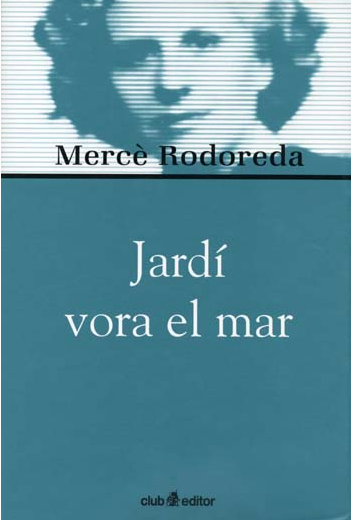
Mercè Rodoreda was a Spanish writer who wrote in Catalan. She’s most famous for her novel La plaça del diamant – In Diamond Square – (also The Time of the Doves). I’ve had that for ages but when I came across the German translation of Jardí vora el mar (The Garden Above the Sea), I couldn’t resist. Unfortunately it hasn’t been translated into English.
The story is set in Spain, in the 20s of the last century. The narrator of the story is a gardener. He’s a widower and has been in charge for the garden that belongs to a villa above the sea since decades, even before the current owners spent their summer vacations in the villa. The story spans six summers, summers that change from playfulness and enjoyment to drama and tragedy. Our narrator is not only a silent witness, he’s drawn into the story as the occupants of the villa treat him like a confidante. During the first year, when the young couple, Rosamaria and Francesc, and their friends spend their first summer at the villa, things seem perfect. The young people are beautiful, rich, joyful. They swim, they party, they tease each other. The gardener watches and listens. At night he refuels in his garden. He listens to the plants breathe, enjoys the scents and colors, cherishes the loneliness.
He loves to watch the young people. He has his favourites. There’s Feliu the painter who only paints the sea. Sebastia who travels in Africa and brings back a lion and a monkey. The summer when the mischievous monkey is at the villa, is by far one of the most entertaining, but some darkness already manifests. It is the summer of the monkey, but also the summer in which the construction of the neighbouring villa begins. At the end of that summer, the monkey goes missing and the young people at the villa feel like it was the last perfect summer. They already know that the villa next doors will be even bigger and more glamorous than their own.
The following summer, the new neighbours move in, and the tragedy unfolds. The past has come back to haunt Rosamaria and Francesc.
In the afterword the novel is compared to Bassani’s The Garden of the Finzi Continis and to The Great Gatsby. There are similarities but it might be especially interesting to point out the differences. The three novels are told by a narrator who is an outsider but while the narrators in Fitzgerald’s and Bassani’s novels circle the orbit of the rich and famous, they are still guests and allowed to take part, while the gardener is distinctly removed. All three books mourn also the end of an era. The Great Gatsby and The Garden Above the Sea are set in the 1920s, while Bassani’s book takes place in the 40s. The Finzi Contini are Jewish. Needless to say how the story will end. Gardens and houses are important in the three novels but nowhere is the garden as much a character as in Rodoreda’s novel. The afterword tells us that the author was a passionate gardener and we can feel that. The descriptions of the flowers, trees, and bushes, their changes through the seasons, the difficulties to grow them are described with so much love, only someone who loves plants could have achieved that. I’ve come across many novels, in which houses are like characters, but I’ don’t think I’ve come across many, in which the garden played such an important role. Not even Bassani’s novel.
The Garden of the Finzi-Continis is easily one of my top ten favourite novels. I also love The Great Gatsby. I enjoyed Rodoreda’s book a great deal, but I only loved the descriptions of the garden. In choosing a gardener as her narrator, as wonderful a character as he may be, we stay much more spectators of the characters, are never fully immersed. We only see what they do when they are outside; we never see them interacting inside of the house. Most of the things we learn, are things the gardener himself was told by someone who heard it from someone. Seeing characters from afar, doesn’t allow to get as close to them as we would wish. Plus, the main protagonists change. Every summer, someone else gets close to the gardener, visits him in his small house. Those are the most intimate moments in the book, the ones, other than the descriptions of the garden, that I enjoyed the most. It’s not always good to compare a book with such famous novels as The Great Gatsby or The Garden of the Finzi-Continis, but in this case it helped me understand, why Rodoreda’s book left me a little cold, although it’s a fantastic book that I might even re-read some day.
The review is part of Richard’s and Stu’s Spanish Literature Month.
